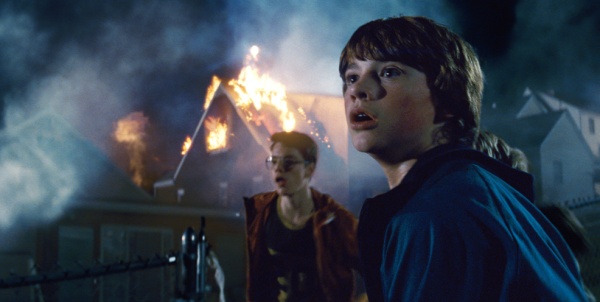The Nostalgic Charms of 'Super 8'
J.J. Abrams's latest film is a heartfelt homage to early Spielberg

It's been five years now since Paramount Pictures chairman Brad Grey first anointed writer/producer/director J.J. Abrams "the next Steven Spielberg." That honorific has subsequently become so commonplace that Abrams might be forgiven if he'd put it on his business cards. But it always seemed to me a clear devaluation of the Spielbergian coin. Abrams's accomplishments on the little screen (Felicity, Alias, Lost) and endeavors on the big one (M:i: III, Star Trek) are all well and good. But Spielberg? Honestly?
Steven Spielberg himself, however, seems not to share this skepticism. At least that's the impression given by his decision to produce Abrams's latest film, Super 8. The movie is a touchingly self-conscious homage to early Spielberg, to Jaws and Close Encounters and E.T., and if it's not at the level of those films, neither does it embarrass itself with the comparison. By turns hokey and suspenseful, intimate and exhilarating, it is a delightful reminder that summer cinema is not required by statute to be crass and loud and stupid.
The movie takes place in 1979, a time when Spielberg was at the height of his pop powers (at least if one discounts 1941, released that year), and J.J. Abrams was in middle school. Not at all coincidentally, the film's protagonists are themselves middle-schoolers; moreover, like Abrams, who began shooting movies on a Super 8 camera when he was 8 years old, they are budding amateur filmmakers: Joe (Joel Courtney), the sensitive makeup artist and model-builder; Alice (Elle Fanning), the reluctant leading lady from the wrong side of the tracks; Charles (Riley Griffiths), the bossy, rotund writer/director; and Cary (Ryan Lee), the heavily dental-braced fireworks fiend. Along with a few castmates, the kids are shooting night scenes for a Z-grade zombie movie when they witness a devastating train derailment and the emergence of a mysterious, predatory menace. It's not long before the sheriff in their fictional Ohio steel town disappears, local dogs make a run for the county line, and a secretive military battalion arrives to "clean up" the undisclosed threat.
Like Cloverfield, which Abrams produced and to which the movie bears many similarities (though not, thankfully, the vertiginous handheld camera), Super 8 is coy about the exact nature of the threat, and in keeping with that spirit I'll stay mum as well. It's worth noting, though, that the particulars of the sci-fi narrative are easily the weakest element of the film. As Abrams demonstrated with Star Trek --which had a black hole where its plot should have been --he's more concerned with storytelling than with story. The further the central mystery unfolds, the more you may wish you could fold it back up again.
The movie is at its best in the taut, early set pieces when danger lurks just outside the frame, and in the likable interplay between its pubescent protagonists. Joe has lost his mother in an industrial accident, and his deputy sheriff dad (Kyle Chandler of Friday Night Lights) shows considerably less aptitude for parenting than for police work. Alice's mother left long ago, and her father (Ron Eldard) is a bitter drunk. Absent mothers, distant fathers--programmatic as the setup may be, the tentative efforts by the two young leads (both very good, incidentally) to find and nurture some glimmer of affection are handled by Abrams with tenderness and tact. There are clever uses, too, of the kids' movie-within-a-movie, as they employ the "genuine" horror flick unfolding in the town as a backdrop for their own fictional one.
Like Spielberg, Abrams has here captured, or at least refracted, the innocence and enthusiasm of childhood, of moviegoing, and of filmmaking itself. Super 8 is a love letter to an era--there are gags about pot and Walkmans; the soundtrack prominently features "My Sharona" and ELO's "Don't Bring Me Down"--but more than that, it is a love letter to a cinematic era, before "blockbuster" became a synonym for "franchise" or "tent pole."
If that weren't enough, the movie evokes a more recent nostalgia as well: for the time, so near and yet so far away, when a summer action film could eschew the tiresome, vaguely desperate enticement of a 3D release. Super 8 is clean and clear and mercifully flat, and that modest act of bravery alone merits a visit to the multiplex.